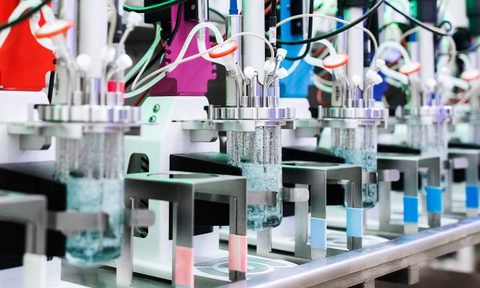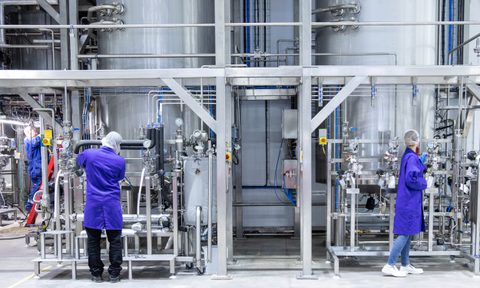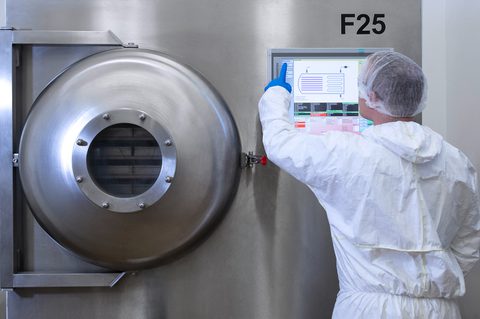

How is Precision Fermentation Accelerating Food Innovation?
Microbial- or precision fermentation is a technology that has been widely used in different industries for decades. It is known to be very scalable using different microbes to produce ingredients at large volumes.
The food industry is undergoing radical evolution in producing the next generation of food ingredients. With a global shift towards reducing our environmental impact creeping into our diets, food manufacturers are increasingly harnessing technology to produce sustainable food ingredients.
Microbial- or precision fermentation is a technology that has been widely used in different industries for decades. It is known to be very scalable using different microbes to produce ingredients at large volumes. Precision fermentation is hailed as the ‘third pillar of the new protein revolution’ (Good Food Institute) and will continue to play a significant role in the production of next generation food ingredients.
The precision fermentation process is a game-changer for food manufacturers. DNA sequences of functional proteins are encoded onto microorganisms, these microbial hosts act as ‘factories’ in which cells capable of producing very precise ingredients duplicate very quickly. Precision fermentation provides a real viable solution for large scale production of specific functional ingredients to support the manufacture of different foods.
Alternative proteins themselves can be produced through precision fermentation, however there are also a range of supporting ingredients required for food manufacture that can be produced at large scale through precision fermentation. Moving away from animal-derived products doesn’t stop at the final food product itself. The requirement for animal-origin-free growth factors are in demand to support the production of cell-based meats. Growth factors play a key role in culturing cells, stimulating the growth of specific tissues and signalling cell differentiation. Microbial/precision fermentation improves the availability of growth factors and allows their cost to be driven down ultimately making the production of cell-based meats a more viable alternative to traditional food proteins.
Traditionally, many food processes have used animal-derived enzymes to modify ingredients, for example rennet in cheese making, or pancreatin in producing infant formulas and modified whey protein powders. Consumer trends for vegetarian products as well as Kosher and Halal certified products has led to a shift by food manufacturers to use processing aids meeting consumer demands and trends. The process of precision fermentation allows the sequence of traditional animal-derived enzymes to be encoded into microbes and produced at scale to replicate the same enzymatic activities. Producing microbial enzymes through fermentation significantly improves the availability and continuity of supply in addition to minimising cost fluctuations and meeting consumer demands whilst not compromising on enzyme functionality.
Supply security is another considered reason why manufacturers seek the manufacture of preservatives through precision fermentation. Lysozyme is widely used as a preservative in many foods, however being derived from egg whites brings with it insecure supply like other naturally sourced products. Further in this example, egg-white derived lysozyme is considered an allergen. Precision fermentation would enable the DNA of natural lysozyme to be encoded into microbial hosts to produce real proteins with almost identical functionality and anti-microbial qualities of the natural lysozyme for use as a preservative with improved product supply but without the allergenicity associated with its natural counterpart.
As the food industry focusses on functional foods, manufacturers are increasingly looking at the use of peptides in food products. Peptides are short chains of amino acids from a wide range of sources from eggs and milk to cereal grains. The amino acid composition of the peptide determines its specific activity such as preventing oxidation and microbial degradation and spoilage of food. Many bioactive peptides are encrypted in a natural protein structure which must be released to harness its benefits. Processing proteins to release the peptide can cause difficulties, as different processing technologies can impair the peptide’s activity during this process. Precision fermentation allows manufacturers to produce peptides at scale that mimic the activity and function of naturally sourced peptides.
Precision fermentation plays a bigger role in your foods than you realised. As a technology capable of reducing costs whilst delivering safe and high-quality scalable proteins sustainably, precision fermentation opens the doors to many exciting developments in the food industry. If you would like to know more information on how Biocatalysts Ltd.’s. fermentation expertise and capabilities can help in upscaling your production, please contact us.



